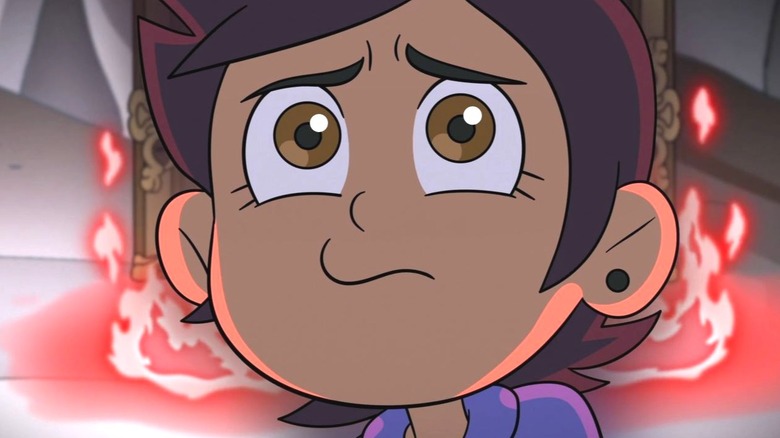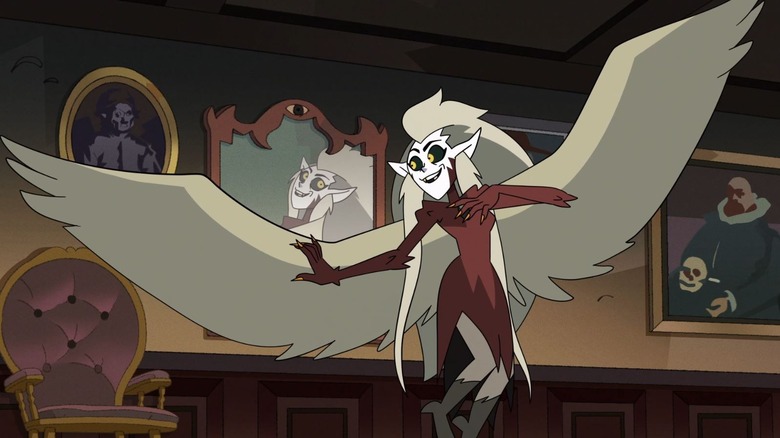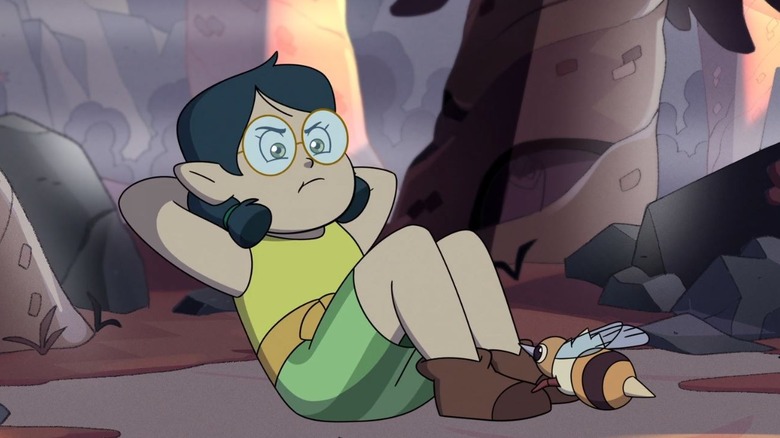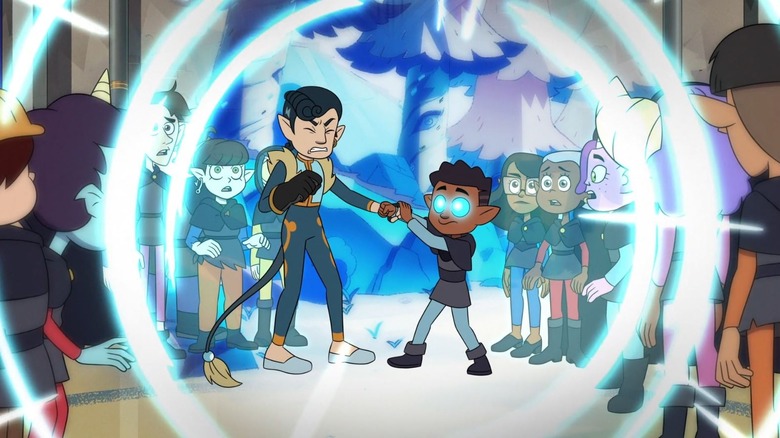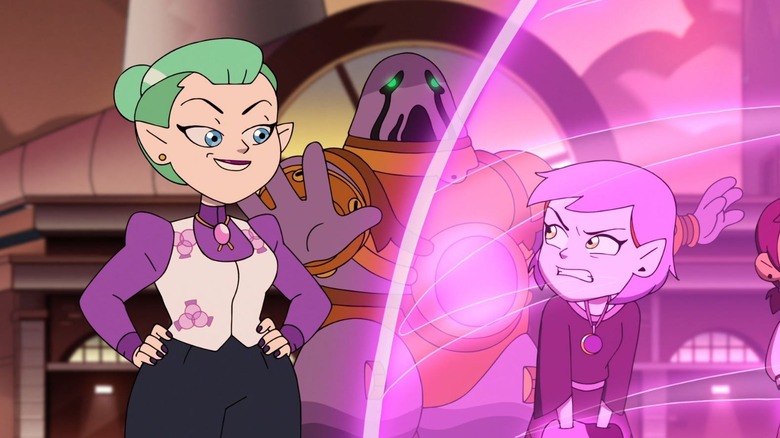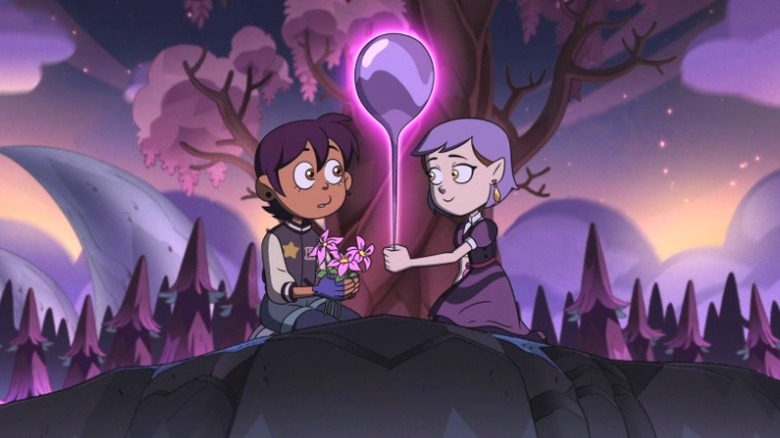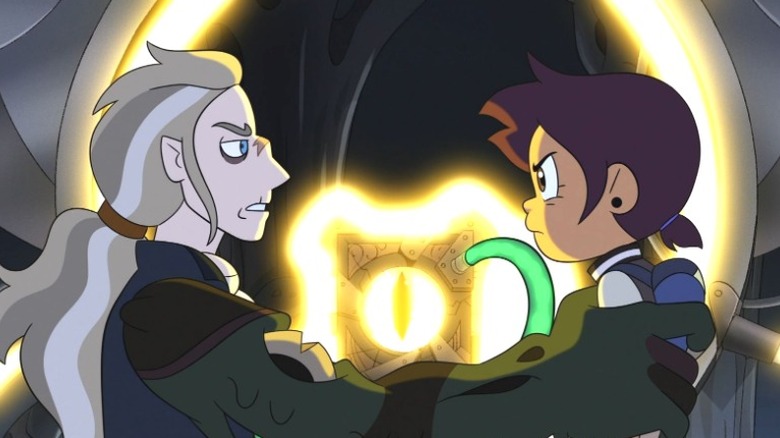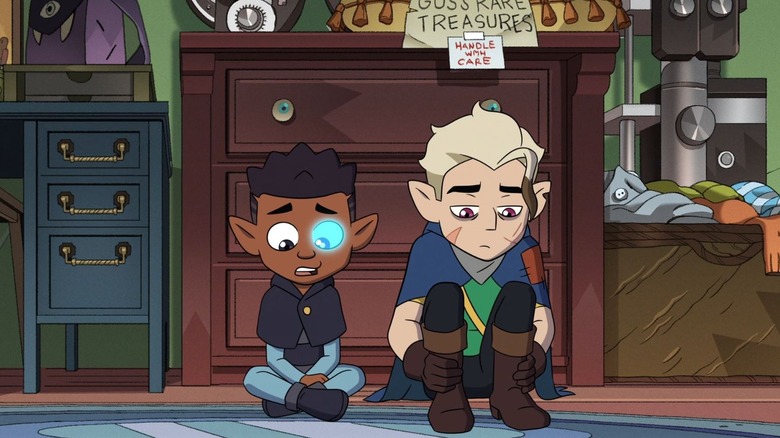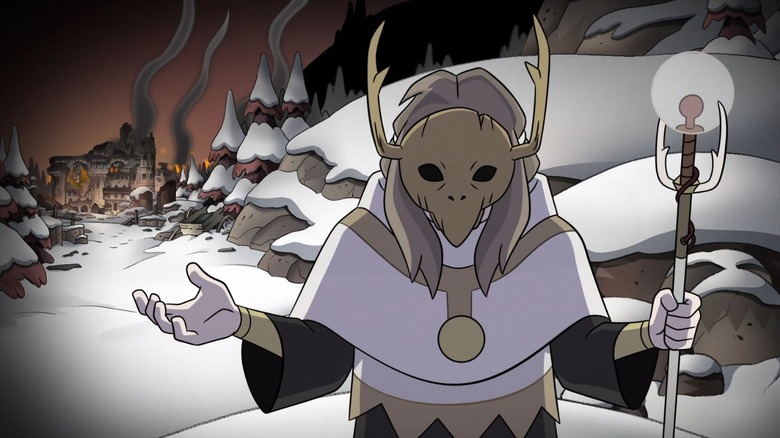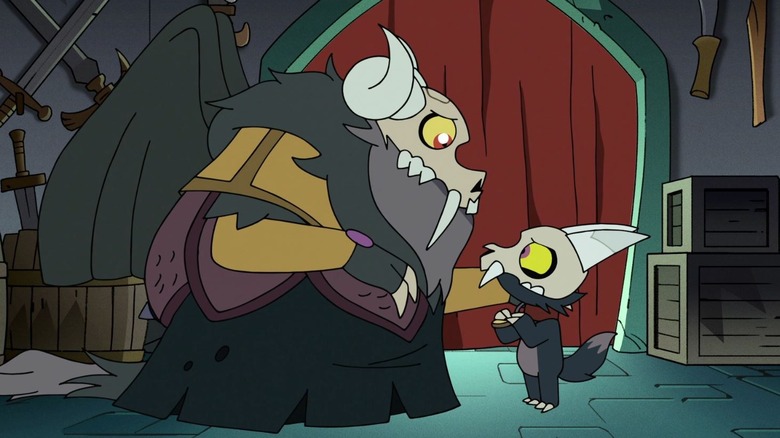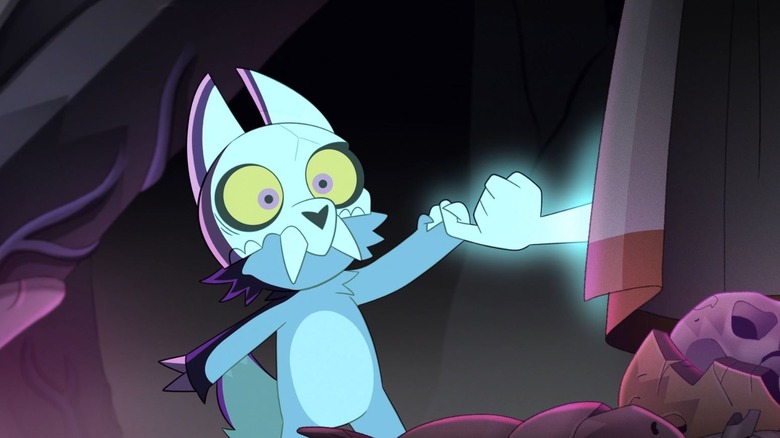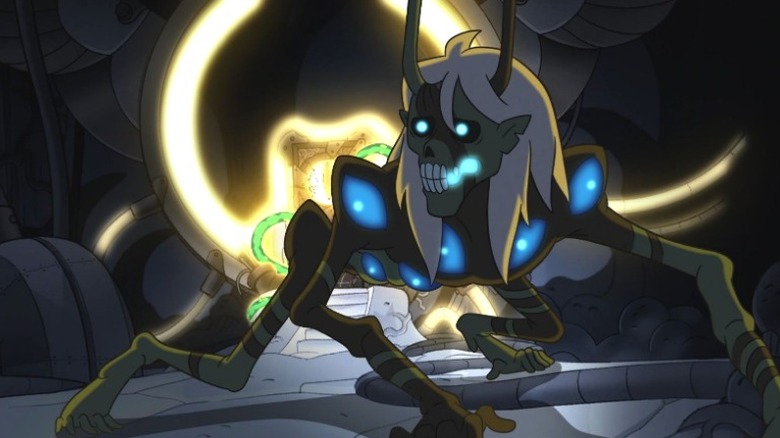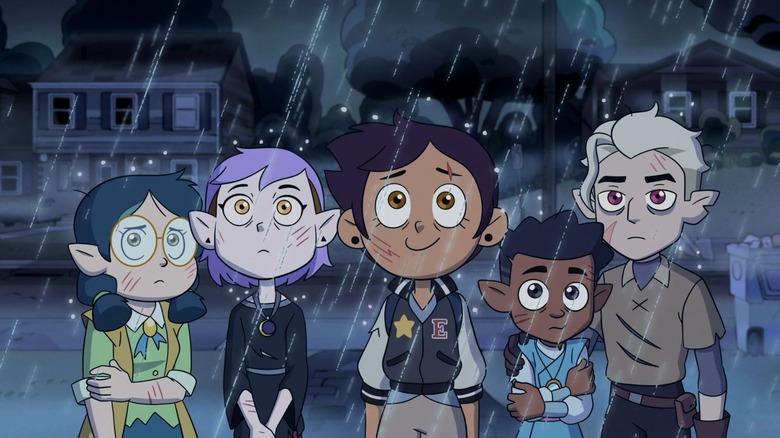The Ending Of The Owl House Season 2 Explained
"The Owl House" may not have started as a groundbreaking series, but during Season 2 the series made Disney+ history with its depiction of LGBTQ characters. While this factor alone is definitely worthy of praise, the storytelling featured in "The Owl House" also deserves its own discussion. Season 2, in particular, featured engaging and relatable character arcs, with relationships starting, evolving, and even ending. It also provided startling revelations while setting up new intriguing mysteries.
To say the story was satisfying would be an understatement. Nevertheless, telling an engaging story about multiple interconnected characters with their own backgrounds, personalities and motivations isn't easy, and the narrative of "The Owl House" grew both in quality as well as complexity. As such, Season 2 demands not just a second viewing but also a careful analysis to identify how it managed to become one of the best series Disney+ has to offer. Here is the ending of "The Owl House" Season 2 explained and what it meant for these groundbreaking characters.
Eda has gained control over her curse
Throughout Season 2 of "The Owl House" viewers learn how destructive the curse has been for Eda's life. It has injured her father, made Eda withdraw from her friends, and eventually caused her to lose her powers. She found a treatment to keep the curse at bay and learned how to cope with the rest of its effects but still sees it as the source of most of her problems.
Eda's curse, however, seems to have a deeper meaning. As the YouTube channel Toon Ruins suggests, there are multiple parallels between how Eda's family responded to her curse and how people react to mental illnesses. Eda's mom rejects her daughter's way of managing her curse and even the opinion of experts while searching for a cure that might not exist. Lilith, on the other hand, doesn't realize how much pain the curse brought to Eda until she goes through it herself.
Eda experiences a breakthrough in the Season 2 episode "Knock, Knock, Knockin' on Hooty's Door" when she's induced into a magically enhanced sleep. During her dream, she first tries to punish the beast for causing so many problems, ignoring her responsibility in actions like pushing people away. However, Eda realizes that the beast is also tied to her against its will and decides to comfort it before asking for a truce. As a result, the sky turns bright and colorful, suggesting she feels better, and after this eye-opening scene Eda wakes up to discover she has acquired a powerful harpy form.
If you or someone you know needs help with mental health, please contact the Crisis Text Line by texting HOME to 741741, call the National Alliance on Mental Illness helpline at 1-800-950-NAMI (6264), or visit the National Institute of Mental Health website.
Willow begins a journey of self-improvement
During the first season, we learn that the reason Willow is underperforming at magic is because she is following the abomination track, which she isn't good at. We also learn that this led Odalia Blight to order Amity to stop seeing her, as she wants her daughter to only socialize with powerful witches. Amity complies after her mother threatens her to use her influence to have Willow expelled from school. As a consequence, Willow remains in Hexide, but is isolated and bullied for years.
In Season 2, Willow has mended her relationship with Amity, but she still feels compelled to prove to everyone who saw her as a weakling that they were wrong. She starts exercising and training at home, which ends up making her a better Grudgby player and more powerful at plant magic. It also boosts her self-esteem, a positive effect of physical activity that, according to a study published in Neuropsychiatric Disease and Treatment, seems to be supported by evidence.
Despite these praise-worthy improvements, Willow's oldest friend, Amity, seems to remain oblivious to them. During an attack on the school, Amity and Willow have to fight against coven guards. Amity ignores Willow's attempts to coordinate an attack and tries to take over, which only leads to confusion. Frustrated, Willow uses her enhanced physical and magical power to beat the guards, forcing Amity to accept that her friend is much stronger than she initially realized.
Gus takes illusion magic to another level
Illusion magic is treated as weak by many characters, but during Season 2 Gus proves them wrong. He uses it in clever ways to deceive enemies and protect his friends. While his skill allows him to be put into higher level classes, this ends up being a double edge sword.
Being younger than his classmates makes Gus easy prey. Many students act like they want to be friends but end up using him to help them with difficult assignments. This has a negative effect on Gus, who starts losing control of his illusion magic during stressful situations, casting vivid illusions that force him to relieve those experiences. During one of these episodes, however, Willow teaches him a breathing technique that allows him to relax and regain control, a method that can help manage anxiety symptoms, per Frontiers in Human Neuroscience.
Gus is able to cast a more powerful version of this spell when the head of the Illusion Coven tries to brand him with an abomination symbol, causing him to panic and envelop part of Hexisde in a mirage. Later, a magic monocle is used to explore Gus' memories against his will, triggering a spell that forces him to relive his worst memories. He's rescued by Hunter, who reminds Gus that his experiences with people who took advantage of him led Gus to believe that he deserved it, but that isn't true. This realization allows him to relax and control the spell.
Amity finally breaks away from her mother's influence
Amity is introduced as an independent and skilled character. She is envied by her classmates both for her performance at school and her social status. It's only later that we learn that Amity has to deal with her controlling mother, Odalia, who frequently invalidates her choices and uses personal attacks which, as Psychology Today explains, are common tactics used by manipulative parents. We see, for example, how Odalia Blight uses this to choose who Amity befriends, what she does after school, and even what color she dyes her hair.
Throughout Season 2, however, we see Amity gradually standing up to her parents. First, she threatens to destroy one of Odalia's Abomatons if she persists in keeping her friends out of Hexside. Later, she participates in the Bonesborough Brawl with the intention of becoming a champion like her father, something her mother considers a waste of time. However, Amity only truly breaks away from her mother's influence after realizing she knew all along that Belos' was planning to exterminate the witches. Seeing that her mother only cares about gaining more power, she promises to never speak to her again, and leaves with her father and friends to fight Belos.
Luz and Amity's relationship has to overcome multiple challenges
Luz and Amity's relationship is, as CherryPicks describes it, "one of the best depictions of queer love" in animation, as it follows a "natural pace." During Season 2, both characters try to find different excuses to spend time with each other and state their confused feelings to family members. Still, it's only after Hooty invites Amity over and sets the stage for a confession that Luz gets the courage to ask Amity out — although it's Amity who ends up asking her first. The following episodes show each character trying to be a good girlfriend, which proves to be harder than expected.
Amity, for example, feels tempted to play a video on Luz's phone, sensing something bad has happened that she is reluctant to share (in this case, the destruction of the portal). Luz, on the other hand, doesn't want to become a burden by complaining about her problems. As a result, Luz is reluctant to share how conflicted she is about promising her mother she will go home and never return to the demon realm or how depressed she feels about not being able to spend the anniversary of her father's passing with her mother. This leads the couple to different misunderstandings, as well as their first fight.
Nevertheless, Amity and Luz learn that they can't support each other if they are not willing to share their feelings, regardless of whether those feelings are good or bad.
Luz's altruism could be a sign of a deeper issue
As her name suggests, Luz has a bright personality. She doesn't just have an almost permanent positive attitude, but she also constantly shows a disposition towards helping others. This makes her one of the most sympathetic characters in the series, as viewers can't help but wish her to succeed and be rewarded by the end of the show. However, while being a people pleaser seems to be encouraged by society, this level of self-sacrifice can also be a sign of low self-esteem, stress, and depression, as explained by an article at Psyche.
As YouTube channel Bunny Skies describes, Luz is constantly trying to help others, sometimes even putting her own well-being second. This self-destructive tendency only gets worse after Luz realizes she accidentally helped Belos when she traveled back in time to meet the human she knew as Phillip. This realization would have been enough to push any character into a depressive state, but in the case of Luz, the effects were probably devastating, explaining her willingness to sacrifice herself to save the people of the Boiling Isles.
Hunter finds redemption through an identity crisis
The first episode of the season introduces Hunter, also known as the Golden Guard, the nephew and right hand of Emperor Belos. The young man is assigned multiple missions like slaying monsters and obtaining more palismen wood, which is necessary for treating Belos' condition. However, after repeated failures, he is convinced he must find a way to prove his worth. That is, until he uncovers Belos' true past.
In "Hollow Mind," Hunter finds himself trapped inside Belos' mind. To his surprise and horror, he discovers through flashbacks how Belos manufactured fake wild magic attacks, which he used to gain people's support. He also learns that he is not really Belos' nephew but a clone of the emperor's brother, Caleb. The story Belos told him, that wild magic users destroyed his family, also ends up being false — a psychological projection of the emperor's guilt for murdering his brother after he tried to start a family with a witch.
Left with no family or identity, Hunter panics at the thought of Belos' discovering he's hiding at Hexside, as he thinks he will destroy him like the previous Golden Guards. Thankfully, when Gus offers his support and teaches him how to control his anxiety, he feels compelled to return the favor and protect him. He eventually joins the rest of the team in their efforts to stop Belos', fighting him directly during the events of "King's Tide."
Belos uses fear as an instrument of control
Belos true past as the witch hunter Phillip is revealed in a somewhat confusing manner. The events are presented through recreations of his diary, flashbacks, and glimpses at paintings representing memories, and they don't always follow a chronological order. However, by the end, it's clear that Belos gathers power through the clever use of fear to manipulate the witches of the Boiling Isles.
We know, for example, that Belos' faked wild magic attacks to instigate fear toward people who used this type of magic, a technique that Dr. Diane E. Dreher reminds us in Psychology Today has historically been used by authoritarians to gain followers. This allows Belos to present himself as the only one capable of protecting witches from this emerging new threat. His powers of persuasion are so strong that, through the years, he manages to persuade hundreds — if not thousands — of witches to be branded with a seal that would limit their ability to use multiple types of magic, convincing them that this was for their own good.
King learns his true origin
Hunter is not the only character who finds himself discovering everything he knew about himself was a lie. In "Echoes of the Past," King leads Lilith, Hooty, and Luz to a set of ruins on the uncharted island that he comes from. There, he realizes that his memories of ruling over a legion of demons and eating feasts were inspired by his early exposure to murals depicting similar scenes. After coping with this revelation, King becomes determined, if not desperate, to learn more about his past.
After sending a message to the people of the Boiling Isles looking for others like him, King is finally rewarded with a mysterious invitation in the Season 2 episode "Edge of the World." This leads him to a group of people with a welcoming demeanor and a similar appearance, only to discover the skulls and fur are nothing more than a costume designed to resemble their prey. He also discovers that the sinister cult worships the Collector and lives to hunt Titans — inadvertently revealing King's true identity as a Titan.
A showdown between King and The Collector seems unavoidable
The final episode of the season sees King use his powers to free the Collector from his magical imprisonment. He makes this choice in a desperate attempt to stop the draining spell from hurting the witches of the Boiling Isles, something that even Belos can't do. In order to convince the Collector, who seems to have a strong interest in games, King offers to teach him a fun activity that requires the participation of every witch in the realm. However, the entity proves to be as powerful as he is unpredictable.
The Collector has the appearance and personality of an immature child, making him potentially more dangerous than Belos. He's also deeply resentful of Belos for not fulfilling his promise of liberating him, something that seemingly leads to the emperor's destruction. If the Collector were to find out that King's promise is a ruse to get him to do what he wants, it's very likely that he will go after King. Nevertheless, fans like Vicente22 have pointed out on YouTube that both characters have a lot in common. They are both very young but powerful beings, and while The Collector never learns to care about other people, King does and could end up teaching him how to empathize with others.
Belos might have returned to the human realm
In the last episode of Season 2, we see Belos' slimy form be defeated by the Collector. A single touch from the Collector is enough to send Belos across the chamber and turn into nothing more than a liquid stain above the portal. Later, we see part of this substance fall on Hunter's shoulder as he crosses into the human realm, and more drops appear to fall from the roof on the human side of the portal during the credits. This suggests that Belos has finally made it back to the human world, but his arrival might not go as smoothly as he would have expected.
It might be true that Belos came from the same town as Luz, but he predates her by several centuries. This could explain his aversion towards anything outside of the norm, interpreting magic and witches as aberrations that must be destroyed. He's also developed an authoritarian worldview and committed multiple crimes that go against the most basic human rights. So even if Belos finds a way to keep his human form in this realm, chances are the people will find his ideology and methods as monstrous as his palisman form.
Will there be a Season 3 of The Owl House?
Season 2 offers viewers an exciting story and multiple revelations. However, there are still a lot of questions left to be answered. It's not explained what actually happened to the Boiling Isles after Luz and her friends crossed the portal, nor do we see what Luz's mom's reaction was after seeing her return, and we still need to find out how the parts of Belos that fell on Hunter will affect him. To answer those questions, we will have to wait until Season 3.
As soon as Season 2 of "The Owl House" was released, Disney confirmed a third season. However, fans also received some bad news. Instead of a full season, Deadline indicates that the third and final season of "Owl House" will consist only of three 44-minute specials. This may sound disappointing as three episodes would probably not be enough to end every character arc and answer every mystery in a satisfactory manner. Sadly, show creator Dana Terrace explained on Reddit that she had to fight just to be able to make these specials, which suggests that Season 4 might be out of the picture.
